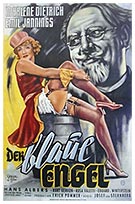
He was re-introduced to the film in the fifties when advising Cambridge’s Rex Cinema on what movies to show. After initially disappointing business the cinema was packed out with students for its final showing:
‘It was all rather like one of those ‘putting on a show’ musicals from Hollywood, in which disaster is averted by the magical last-minute appearance of a society audience including all the most influential backers and critics.’
Josef von Sternberg directs Marlene Dietrich as Lola-Lola, and Emil Jannings as…
‘…a stodgy old professor who goes to a night club in order to clear his students out, and then himself falls for the tawdry singer’
Despite the full house, LH was worried that the audience might not appreciate this primitive entertainment –
‘I was anxious lest this crowded and critical house should vent its exasperation by mocking the heavily overstressed acting and the pretentious direction. But no, the wonderfully lustrous print… seemed to hypnotise everyone present.’
They, like the audience of twenty years before, were transfixed by Marlene’s husky voice and sensuous smile. However –
‘The Blue Angel could no longer have that effect. We are all too sophisticated now, and the prints available to us are several generations less gleaming than the one I saw on that famous Cambridge occasion, when we seemed almost to be able to smell the squalid nightclub and to feel the sweat on the professor’s brow.’
It comes over as a rather primitive entertainment now, and so must be viewed in its historical context –
‘One watches it for Dietrich; for Jannings… and for the story-telling technique of the director… contriving to engage our eye and lead it from one shot to another according to the dictates of his ever darkening story…’
First encountered by LH in Bolton –
‘I had seen it once, at the unsuitable age of five, in a Bolton fleapit called the Atlas, where it was said they loaned you a hammer along with your ticket.’
Even at that ridiculously young age, the critic in Halliwell was already growing:
‘I had a vague memory of scratchy music and impressive visual compositions…’

Halliwell |
| The Blue Angel |